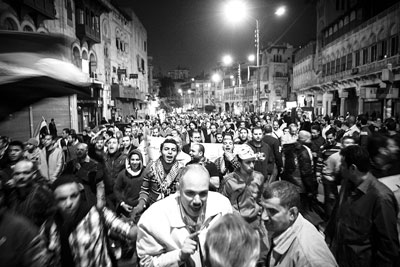(lead article)
Actions across Egypt protest
gov’t anti-democratic moves
Islamists countermobilize, defend
president’s declared powers

|
|
Hossam el-Hamalawy
|
|
Tens of thousands march to presidential palace in Cairo Dec. 4 to protest decree by Egyptian President Mohamed Morsi that strengthen powers of executive office.
|
BY SETH GALINSKY
Egyptian President Mohamed Morsi’s Nov. 22 decree that all his decisions are “final and binding and cannot be appealed” provoked a debate and protests around the country.
The size and scope of street actions illustrate the challenge facing the Muslim Brotherhood in its efforts to clamp down on rights and space for working people to organize, which were opened through the popular fight to overthrow the tyranny of Hosni Mubarak in February 2011.
Demonstrations against the decree—and a draft constitution approved a week later by a Muslim Brotherhood-dominated constituent assembly—have taken place in Alexandria, Beni Suef, Beheira, Qena, Ismalia, Port Said, North Sinai, and Mahalla—a center of union fights by textile workers—as well as in Cairo. In many cities there were clashes with Morsi supporters.
The Muslim Brotherhood, the largest and best-organized party in the country, is mobilizing to defend Morsi. Tens of thousands backed by various Islamist forces demonstrated at Cairo University Dec. 1.
The protests against Morsi’s decree reveal a heterogeneous opposition to the Muslim Brotherhood and its move to strengthen executive powers under its rule, as well as divisions within the country’s ruling class. The opposition ranges from competing factions among the capitalist rulers, including remnants of the Mubarak regime, to petty-bourgeois centrist and social democratic parties, to organized labor.
To garner support for his move, Morsi included in the decree the removal of the attorney general, a disliked holdover from the Mubarak government. One pretext for the decree—issued soon after he was lauded by Washington for his role in brokering a cease-fire between Tel Aviv and Hamas in Gaza—was the pledge to use his powers to reopen cases of repression during Mubarak’s rule.
As opposition grew, Morsi declared Nov. 26 that his new powers were only temporary, until the draft constitution was voted on in a referendum now set for Dec. 15 and elections for a new legislature take place.
The government-owned Ahram newspaper reported that Morsi intervened “to contain the anger of some worshippers during Friday prayers in an upscale district of Cairo, when the mosque’s preacher dedicated his sermon to defending Morsi’s latest decisions.” Morsi invited hecklers there to “talk for a few minutes,” the paper said.
To protest against the decree, 11 big-business newspapers did not go to press Dec. 4. The Supreme Judicial Council, made up of judges appointed by Mubarak, also condemned the decree.
Heterogeneous opposition
More than 100,000 demonstrators filled Cairo’s Tahrir Square Nov. 27, the site of many large demonstrations against Mubarak and the military regime that took his place. Another large opposition demonstration took place Nov. 30.
Among the participants at the Nov. 30 rally were Mohamed El Baradei, former head of the U.N. International Atomic Energy Agency and leader of the bourgeois Constitution Party; Amr Moussa, former Arab League head and Mubarak’s foreign minister; supporters of Mubarak’s former Prime Minister Ahmed Shafiq, who came in second to Morsi in the presidential elections; Al-Sayed al-Badawy, head of the liberal capitalist Wafd Party; and a variety of social democratic and left groups.
The participation of Mubarak supporters, referred to by their opponents as felool [remnants of the old regime], is a contentious issue within the opposition. “There are definitely people within the opposition camp who are willing to coordinate with them,” Hossam al-Hamlawy, from the social democratic Egyptian Revolutionary Socialists, told al-Jazeera. “This has created an unease with others.”
Protesters have criticized the draft constitution, which promises some freedoms, only to nullify them with contradictory stipulations.
While the draft says “freedom of thought and opinion shall be guaranteed,” it prohibits “insults or abuse of all religious messengers and prophets” and “insulting or showing contempt toward any human being.”
Among the controversial sections of the draft’s 236 clauses is one that prohibits “military trials for civilians, unless for crimes that affect the armed forces,” widely seen as a green light for the military to continue arresting civilians.
Union federation protests decree
The Egyptian Federation of Independent Trade Unions, with nearly 2.5 million members, issued a statement Nov. 25 calling on workers to mobilize against the decree.
“How can the president issue laws, and work to implement them, without any one of us having the right to go to the judiciary to challenge them?” asked the union federation. “What if he issued a decree banning all the unions which have been set up since the revolution?”
Attempts to quell strikes, sit-ins and demonstrations by the military regime that immediately replaced Mubarak and the Muslim Brotherhood government that followed it have been unsuccessful.
The union federation also criticized the draft constitution. “All of the drafts which came out of the Constituent Assembly have been completely empty of rights for workers, peasants, fishermen, workers in informal jobs,” the statement notes. “At the same time, the drafts protect the interests of factory owners and company directors.”
The Egyptian Federation of Independent Trade Unions was formed in the fight against Mubarak, bringing together workers organizing independently of the government-sponsored union federation. The first law issued by Morsi after his decree gives him the power to replace board members of the old federation, which still claims 4.5 million members.
| 


